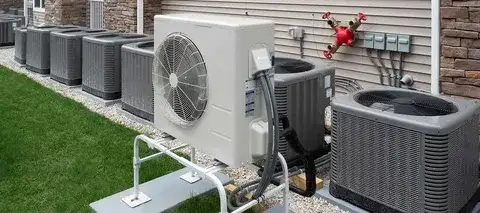This guide will provide you with detailed information about Heat Pump vs Mini Split to clear your concepts. Building owners and contractors need to choose the right HVAC system for buildings. That is why these two terms are always in discussion. For this reason, people search for them on the net to choose the right one for their project. For a simple explanation, just think of one of them as a square and the other as a rectangle. That means they are not identical.
If you are a busy contractor working on a complex project. It is better to get professional HVAC construction cost estimates from a reliable company. They will provide you with accurate information about the project cost required. This way, you can work on your comfort and within budget!
Let us now provide you with a detailed overview of these two terms:
YOU NEED TO LOOK AT DIFFERENT FEATURES OF HEAT PUMPS AND MINI-SPLITS TO CHOOSE THE RIGHT ONE ACCORDING TO YOUR NEEDS!
Heat Pump Overview
A heat pump is a type of HVAC system that transfers heat using electricity. As compared to old systems that generate heat by burning fuel. Heat pumps can easily move heat around.
In summer, a heat pump works just like an AC. It sucks the heat from the inside to cool your space. Whereas, in winter, the process is contrary to that. From the outdoor air, heat is transferred to the inside of the buildings. However, this reversing ability is due to the reversing valve.
There are 3 types of these systems:
Air Source Heat Pumps
The most common type of these extracts is heat from outdoor air. They are affordable that ranging between $3,500 to $7,500.
Water Source Heat Pumps
These draw heat from nearby water sources. This offers better performance than air temperature.
Geothermal Heat Pumps
The most expensive but also most efficient option, these systems extract heat from the ground. Because ground temperatures remain relatively constant year-round, they provide excellent efficiency.
Mini Split Overview
A mini split does not require any ducts. It is also used to heat and cool the inside space. Well, it consists of two major components: one is an outdoor compressor unit and the other is one or more indoor air-handling units.
Differences Between Heat Pumps and Mini Splits
1. Ductwork Requirements
Heat Pumps
They require ductwork to work properly inside the building. If you are moving into a house that already has installed ductwork, then you must get a heat pump.
Mini Splits
They do not require any type of ductwork. They are ideal for those who have no ductwork in their buildings. The best thing about it is that there is no fear of energy loss.
2. Temperature
Heat Pumps
It can easily maintain the entire building temperature through one thermostat. The zoned systems are possible with multiple thermostats. But they require more budget. That is why expert HVAC Estimation is best to fulfill your needs.
Mini Splits
In this system, every unit is working on its own. That is why you can set different temperatures for everyone. If you want to keep your room warm and your living areas cooler. You can easily achieve that.
3. Installation Complexity
Heat Pumps
If there is desired ductwork installed in your buildings, your heat pumps will be installed within a day. But if you have to work on installing the duct, it will take several weeks and incur more costs.
Mini Splits
Installation is quick because there is no need for complex ductwork. It only includes the installation of indoor units and the outdoor compressor.
4. Cost Considerations
Heat Pumps
- Initial installation: $4,300 to $8,000 on average for air source models
- Lower upfront costs if ductwork is already present
- It can be more expensive if ductwork installation is required
- Generally, higher maintenance costs due to more complex systems
Mini Splits
- $1,000 to $3,500 per unit is required for equipment
- Lower installation costs for single-zone applications
- Costs increase with multi-zone systems requiring multiple indoor units
- It requires lower maintenance costs
5. Energy Efficiency
Heat Pumps
They are reliable to choose because they provide 300% to 400% efficiency. They provide 3 to 4 times the heating and cooling energy.
Mini Splits
Energy use is reduced by up to 30%. They reduce energy losses because they require no ductwork. However, they are less effective than heat pumps.
6. Lifespan
Heat Pumps
The life of a heat pump is 15 to 20 years if properly maintained. To maintain them, you need to change filters regularly.
Mini Splits
They last approximately 20 years. Some of them may work for 30 years if maintained. Each indoor unit requires individual maintenance.
Conclusion
In short, this guide about Heat Pump vs Mini Split is clear for all building owners. They can choose one of them according to their needs. Plus, the investors also have to dig into the budget they have to install. That is why professionally hiring experts for duct takeoff is a reliable decision. However, your choice should be guided by your specific comfort needs and goals.

